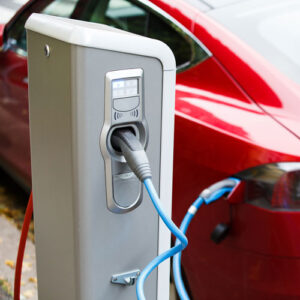 Is there a charging station in your future?
Is there a charging station in your future?
An Act concerning the Installation of Electric Vehicle Charging Stations in common interest communities was adopted by the New Jersey legislature and is codified as part of the Planned Real Estate Full Disclosure Act (N.J.S.A. 45:22A-43 et seq.).
An association may not adopt or enforce a restriction, covenant, bylaw, rule, regulation, master deed provision, or provision of a governing document prohibiting or unreasonably restricting the installation or use of an electric vehicle charging station in a designated parking space. Any such restriction is void and unenforceable.
The association by and through its board shall grant exclusive or limited use of any portion of a common element to a unit owner: (a) to install and use an electric vehicle charging station in a unit owner’s designated parking space, where the installation or use of the charging station requires reasonable access through or across the common elements for utility lines or meters or (b) to install and use an electric vehicle charging station through a license granted by an association at a common area parking space for the exclusive use of a unit owner for the charging station.
Reasonable restrictions can be imposed by the associations
A charging station must meet applicable health and safety standards imposed by the State and local authorities as well as zoning and land use requirements including obtaining permits. An association’s approval must be processed in the same manner as a request for architectural modification to the property and approval may not be willfully avoided or delayed. If an application is not denied in writing within 60 days from the date received, the application shall be deemed approved, unless that delay is the result of a reasonable request for additional information.
 If an association reasonably determines that the cumulative use of electricity on the premises attributable to the installation and use of electric vehicle charging stations requires the installation of additional infrastructure improvements to provide the premises with a sufficient supply of electricity, then the association may hold an application for approval in abeyance until the upgrades are completed.
If an association reasonably determines that the cumulative use of electricity on the premises attributable to the installation and use of electric vehicle charging stations requires the installation of additional infrastructure improvements to provide the premises with a sufficient supply of electricity, then the association may hold an application for approval in abeyance until the upgrades are completed.
A charging station installed for the exclusive use of a unit owner must: (1) if required by association’s governing documents or rules and regulations, first obtain approval from the association to install the electric vehicle and the association shall approve the installation if the provisions of this section are met and the unit owner agrees in writing to:
- Comply with the association’s architectural standards for the installation of the electric vehicle charging station;
- Engage a licensed electrician to install all necessary electric lines and electrical infrastructure in compliance with the association’s architectural standards;
- Within 14 days of approval and prior to installation, obtain and maintain at all times, while the electric vehicle charging station is in place, insurance protecting the association and the other unit owners from damage as a result of the existence and operation of the electric vehicle charging station, and provide evidence of insurance specifying that insurance covers the charging station;
- Pay for the electricity usage; and
- Pay for reasonable charges imposed by an association to recover the costs of the review and approval of an application for the installation or use of the charging station including reasonable engineering and legal fees. The association can require that a reasonable estimate of fees be put in escrow in advance of the review. An association can deny an application if it reasonably concludes that the electric vehicle charging station constitutes a life-safety risk.
 Special assessment of costs
Special assessment of costs
If an association reasonably determines that the cumulative use of electricity on the premises attributable to the installation and use of charging stations requires installation of additional infrastructure improvements then the association may special assess the cost of those additional infrastructure improvements to the unit owners who have installed electric vehicle charging stations and have applied to install in equal shares per electric vehicle station. An association may require a unit owner to pay a special assessment before the unit owner may install a charging station.
The unit owner of a charging station and any successive unit owner of the charging station shall be responsible for the cost of the following items:
- Any damage to the charging station, the parking space, a common element, a limited common element, the property of other unit owners, or separate interests, which damage results from the installation, maintenance, repair, removal, or replacement of the charging station;
- Any maintenance, repair and replacement of a charging station, and restoration of the area after removal of the electric vehicle charging station;
- The electricity usage associated with the electric vehicle charging station;
- All installation costs associated with electric vehicle charging stations; and
- Any costs associated with an application for the installation or use of an electric vehicle charging station to satisfy applicable health and safety standards and requirements imposed by State and local authorities, including but not limited to applicable zoning, land use, and other ordinance requirements.
The unit owner or successive owners have the obligation of disclosing to prospective buyers the existence of the charging station and responsibilities for it.
Other requirements
A unit owner and each successive unit owner of a charging station shall at all times maintain a homeowner’s liability coverage policy in the amount of $100,000 and shall name the association as a certificate holder with the right to receive a notice of cancellation. The association can require a policy in excess of $100,000 if the governing documents or rules and regulations require all unit owners to carry a greater amount.
If a unit owner fails to procure or maintain the insurance required, the association may procure insurance on the unit owner’s behalf and charge the unit owner the cost of the insurance. The unit owner shall hold the association and the other unit owners harmless from any and all claims caused by the charging station.
The board may license, for a defined period of time, as set forth in the license, a common area parking space for the exclusive use of a unit owner for the installation of an electric vehicle charging station at the sole discretion of the board.
Association may install an electric vehicle charging station in common element parking spaces
The association may install an electric vehicle charging station in common element parking spaces for the use of all unit owners and adopt rules and regulations for use. An association may create a parking space where one did not previously exist to facilitate the installation of a charging station. If an association creates a parking space to accommodate a charging station for the exclusive use of a unit owner, the unit owner shall be responsible for all costs associated with creating the space including but not limited to land use approvals, permits, reviews, easements, and construction costs.
This information should not be considered legal advice and is not intended as a substitute for consultation with an attorney. This website is an advertisement by the law firm of Radom & Wetter. No aspect of this advertisement has been approved by the Supreme Court of New Jersey. Radom & Wetter is a law firm in the state of New Jersey and serves the following communities; Atlantic County, Bergen County, Burlington County, Camden County, Cape May County, Cumberland County, Essex County, Gloucester County, Hudson County, Hunterdon County, Mercer County, Middlesex County, Monmouth County, Morris County, Ocean County, Passaic County, Salem County, Somerset County, Sussex County, Union County and Warren County.